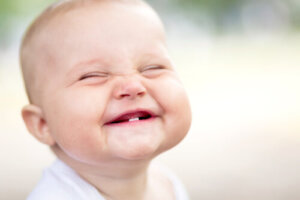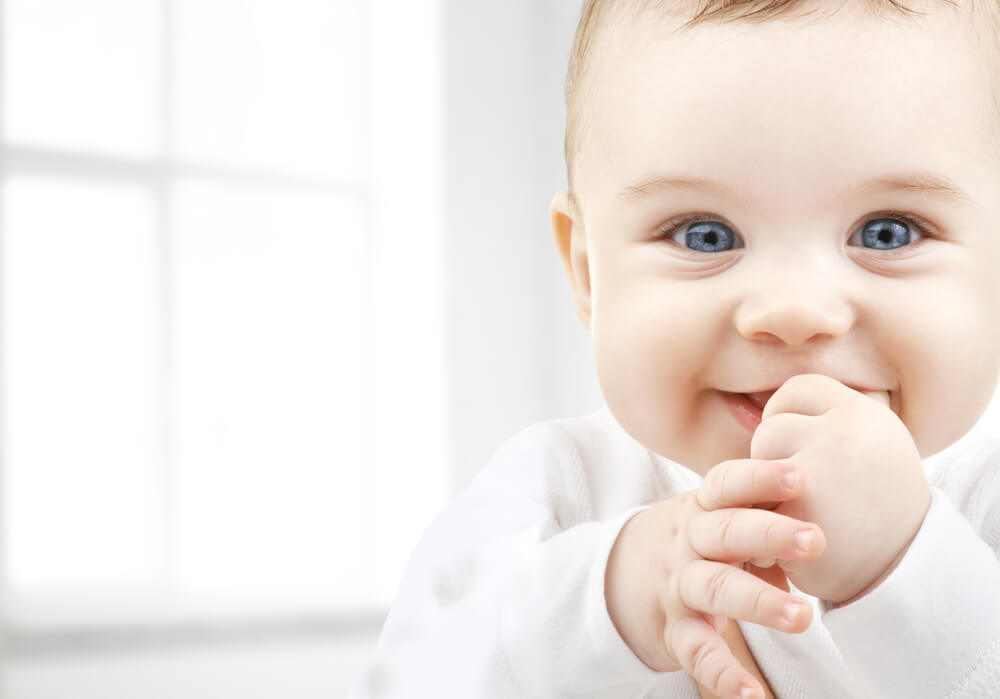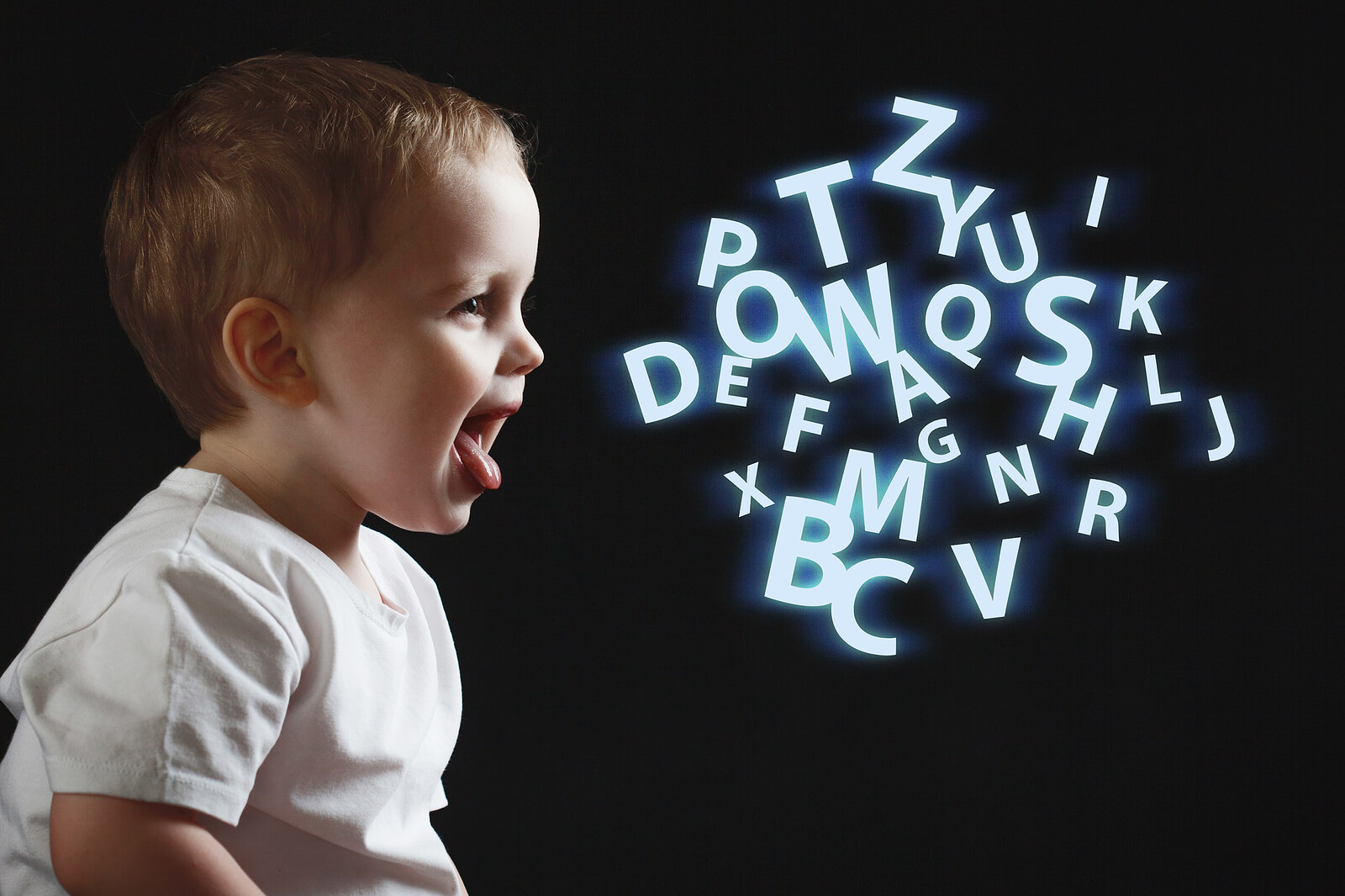A Dictionary of Your Baby's First Words: A Beautiful Keepsake

When you have children, every little achievement they reach is a source of pride and admiration. Early childhood passes in the blink of an eye and treasuring moments of happiness is always a great idea to then return to them with nostalgia. Today, we’ll show you how to make a dictionary of your baby’s first words, a beautiful and original souvenir.
Life is full of firsts and as parents, we’re fortunate to accompany our children in many of them. Like the victory of their first steps and the emergence of their first baby teeth. Or their first day at kindergarten and then their first day at school. So enjoy every moment to the fullest, because then they’ll soon only be beautiful memories that will live forever in your heart.
You might be interested in: A Baby’s First Words: Which Are the Most Common Ones?
Start recording your baby’s first words in a journal
Keeping a journal with memories of both pregnancy and your children’s early years is a lovely pastime that will become a family heirloom over the years. So, if you’re keeping one right now, remember to patiently record all the vocabulary your baby gains over the months.

The first shy “mama” or “dada” happens around eight or nine months. And it’s normal to get excited and think your little angel is trying to call you. However, the truth is that these first utterances are usually nonspecific words. So, when they’re uttered, your baby isn’t yet aware of their meaning.
From the age of one year, children begin to understand that their words have meaning and reactions in others. However, during these first attempts at communication, it’s very difficult to understand them as they’re often unintelligible words. The first consonant phonemes that young children learn are b/d/l/m/n/p/t. And by combining them with vowels, they form the first words: “tata” “mama”, “papa”, “lala”.
It’s at this time when they begin to have the ability to make fun distinctions. For example “vroom vroom” to refer to cars or “poopoo” to imply that they want their diaper changed. However, one can’t generalize, and it’s common for some children to take a little longer to start saying their first words.
Vocabulary after the first year is the most fun
After twelve months, children’s vocabulary begins to increase exponentially. For example, the use of onomatopoeias to refer to objects or animals by their noise (ruff ruff/dog) (moo/cow). And soon a stage in language development known as the “holophrastic period” will begin where young babies construct one-word sentences (water/want water).

So, make note of each new word your children try to use to communicate. Some will be funnier than others and only some will remain forever etched in the parents’ memory. This way, the first words won’t fall into oblivion and your little ones will be able to see how their vocabulary has changed over the years.
Then, when they begin to formulate their first meaningful sentences, write down all those funny mistakes that will later become anecdotes. During the ages of 2 and 3, their vocabulary will make you laugh non-stop with their innocent witticisms. Remember to accompany their phrases with pictures according to their age and enjoy every moment of this stage that’s so short, but at the same time, so beautiful.
Having a dictionary of your baby’s first words is one of the best emotional gifts we can give our children. Just like all those memories that come after the birth. Such as a hospital bracelet, a lock of hair, handprints and footprints, their first clothes on, their first baby tooth, drawings, photographs, etc.
Continue reading: 10 Emotional Gift Ideas for Children Under 10
A dictionary with your baby’s first words is a beautiful detail
Emotional gifts are those gifts that are loaded with a great sentimentality that goes beyond their material value. They’re details where all the affection that can be felt for a person is captured. And some examples of them are pregnancy/maternity diaries or a dictionary with a baby’s first words.
All children like to hear anecdotes of their first months and years. How they were amused by the words “poop” or “pee” or how they affectionately referred to their parents. They’re sure to get a smile on their face when they remember their stuffed animal “coco” or their aunt “tata “. And everyone will have a great time with this great object in their memory box.
And having the opportunity to read all the milestones that the little ones were gaining little by little is something that not everyone has the privilege to experience. So if you want to read later to your children all the things you went through together, don’t hesitate to collect that information that at some point will be looked at with gratitude and joy.
When you have children, every little achievement they reach is a source of pride and admiration. Early childhood passes in the blink of an eye and treasuring moments of happiness is always a great idea to then return to them with nostalgia. Today, we’ll show you how to make a dictionary of your baby’s first words, a beautiful and original souvenir.
Life is full of firsts and as parents, we’re fortunate to accompany our children in many of them. Like the victory of their first steps and the emergence of their first baby teeth. Or their first day at kindergarten and then their first day at school. So enjoy every moment to the fullest, because then they’ll soon only be beautiful memories that will live forever in your heart.
You might be interested in: A Baby’s First Words: Which Are the Most Common Ones?
Start recording your baby’s first words in a journal
Keeping a journal with memories of both pregnancy and your children’s early years is a lovely pastime that will become a family heirloom over the years. So, if you’re keeping one right now, remember to patiently record all the vocabulary your baby gains over the months.

The first shy “mama” or “dada” happens around eight or nine months. And it’s normal to get excited and think your little angel is trying to call you. However, the truth is that these first utterances are usually nonspecific words. So, when they’re uttered, your baby isn’t yet aware of their meaning.
From the age of one year, children begin to understand that their words have meaning and reactions in others. However, during these first attempts at communication, it’s very difficult to understand them as they’re often unintelligible words. The first consonant phonemes that young children learn are b/d/l/m/n/p/t. And by combining them with vowels, they form the first words: “tata” “mama”, “papa”, “lala”.
It’s at this time when they begin to have the ability to make fun distinctions. For example “vroom vroom” to refer to cars or “poopoo” to imply that they want their diaper changed. However, one can’t generalize, and it’s common for some children to take a little longer to start saying their first words.
Vocabulary after the first year is the most fun
After twelve months, children’s vocabulary begins to increase exponentially. For example, the use of onomatopoeias to refer to objects or animals by their noise (ruff ruff/dog) (moo/cow). And soon a stage in language development known as the “holophrastic period” will begin where young babies construct one-word sentences (water/want water).

So, make note of each new word your children try to use to communicate. Some will be funnier than others and only some will remain forever etched in the parents’ memory. This way, the first words won’t fall into oblivion and your little ones will be able to see how their vocabulary has changed over the years.
Then, when they begin to formulate their first meaningful sentences, write down all those funny mistakes that will later become anecdotes. During the ages of 2 and 3, their vocabulary will make you laugh non-stop with their innocent witticisms. Remember to accompany their phrases with pictures according to their age and enjoy every moment of this stage that’s so short, but at the same time, so beautiful.
Having a dictionary of your baby’s first words is one of the best emotional gifts we can give our children. Just like all those memories that come after the birth. Such as a hospital bracelet, a lock of hair, handprints and footprints, their first clothes on, their first baby tooth, drawings, photographs, etc.
Continue reading: 10 Emotional Gift Ideas for Children Under 10
A dictionary with your baby’s first words is a beautiful detail
Emotional gifts are those gifts that are loaded with a great sentimentality that goes beyond their material value. They’re details where all the affection that can be felt for a person is captured. And some examples of them are pregnancy/maternity diaries or a dictionary with a baby’s first words.
All children like to hear anecdotes of their first months and years. How they were amused by the words “poop” or “pee” or how they affectionately referred to their parents. They’re sure to get a smile on their face when they remember their stuffed animal “coco” or their aunt “tata “. And everyone will have a great time with this great object in their memory box.
And having the opportunity to read all the milestones that the little ones were gaining little by little is something that not everyone has the privilege to experience. So if you want to read later to your children all the things you went through together, don’t hesitate to collect that information that at some point will be looked at with gratitude and joy.
All cited sources were thoroughly reviewed by our team to ensure their quality, reliability, currency, and validity. The bibliography of this article was considered reliable and of academic or scientific accuracy.
- Montecinos, J. P. (2000). Adquisición y desarrollo del lenguaje y la comunicación: una visión pragmática constructivista centrada en los contextos. Límite: revista de filosofía y psicología, (7), 54-66. Recuperado de: https://dialnet.unirioja.es/descarga/articulo/2053242.pdf
- Navarro Pablo, M. (2003). Adquisición del lenguaje. El principio de la comunicación. Cauce, 26, 321-347. Recuperado de: https://idus.us.es/xmlui/bitstream/handle/11441/13138/file_1.pdf?sequence=1
- Rodríguez, J. J., & Santana, A. M. M. (2010). Adquisición y desarrollo del lenguaje. A.(. Muñoz García, Psicología del desarrollo en la etapa de educación infantil, 101-120. Recuperado de: https://dialnet.unirioja.es/servlet/articulo?codigo=3332436
- Rivero-García, M. (1994). Influencia del habla materna en los inicios de la adquisición del lenguaje: primeras palabras y primeros enunciados de más de una palabra. Revista de Logopedia, Foniatría y Audiología, 14(3), 148-155. Recuperado de: https://www.sciencedirect.com/science/article/abs/pii/S0214460394755972
This text is provided for informational purposes only and does not replace consultation with a professional. If in doubt, consult your specialist.








